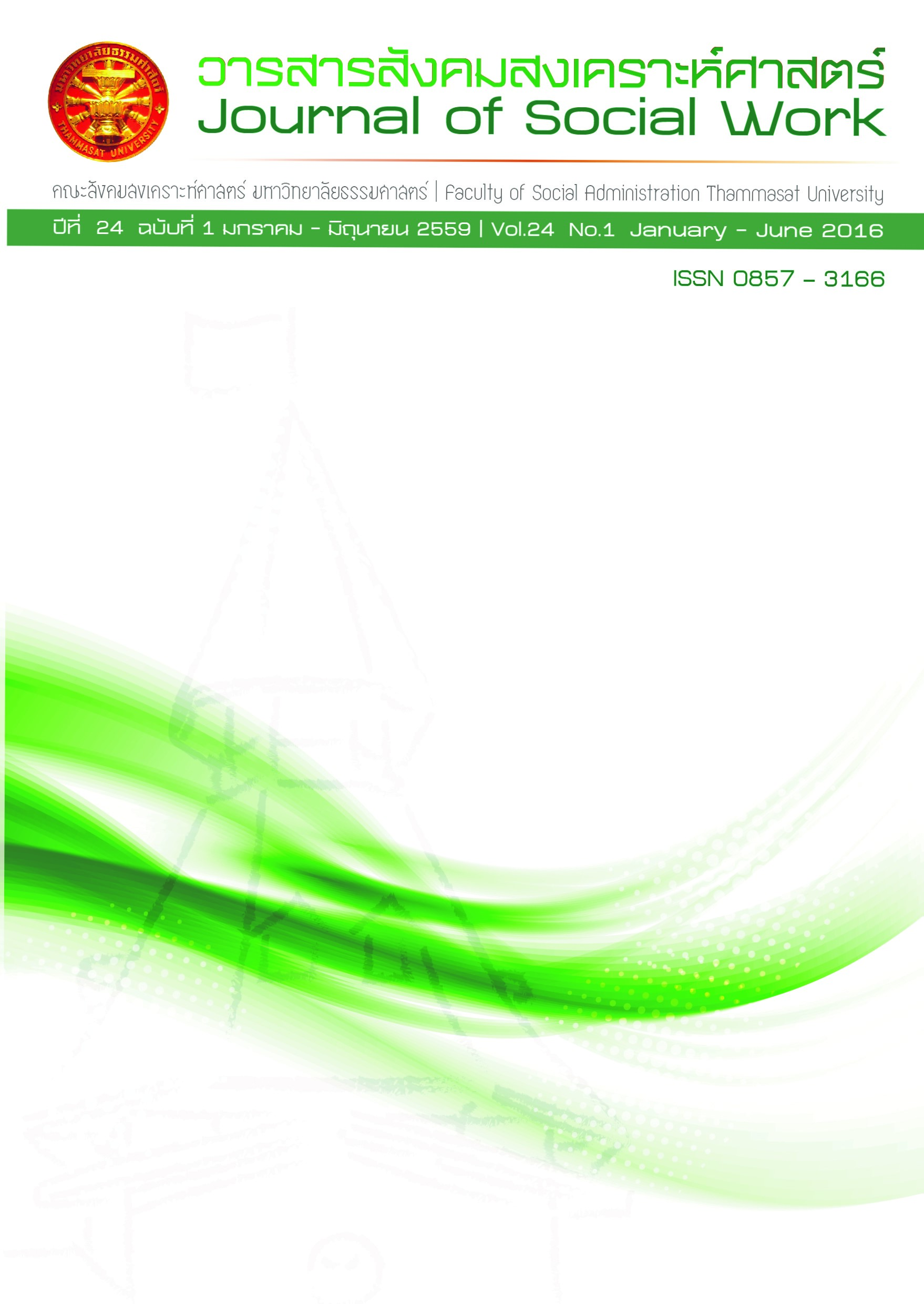The Evaluation of Children And Youth Council Development
Keywords:
Children and Youth Council, Youth’s Potential Development, Youth Development CurriculumAbstract
The research entitled the evaluation of child and youth council development aims to (1) To evaluate the children and youth council under the child and youth standards (2) To examine and improve child and youth council towards National Children and Youth Development Promotion Act B.E. 2550 (3) To develop Thai child and youth leader’s potential development curriculum. This research utilizes mix-methods methodology both quantitative and qualitative research. For the quantitative research, researchers created an evaluation tool to measure the efficiency of children and youth council regarding National Children and Youth Development Promotion Act B.E. 2550 act and children and youth standards. Qualitative research method, conducting the interview with the 3 experts on child and youth learning, civic education, and curriculum development. Moreover, researchers applied focus group technique with the leaders of children and youth council committee and the child and youth council counselors. In terms of trustworthiness, researchers utilized data triangulation technique. The quantitative result from 360 samples found that children and youth council appropriately demonstrated their role regarding the act. Thus, resource mobilizing and collaboration with government and non-government parties had been found that theirs were underestimated expectation. Qualitative result found that children and youth council committee and related people discovered 15 issues which were the approach to develop child and youth council leaders. Knowledge, skills, and tools were merged in these issues. In addition, the goal of all approaches is physical, emotional, social, and intellectual development for children and youth council leaders.
References
กระทรวงศึกษาธิการ. (2554). กระทรวงศึกษาธิการ 109 ปี. พิมพ์เป็นที่ระลึกงานวันคล้ายวัน สถาปนากระทรวงศึกษาธิการ ครบรอบ 109 ปี. กรุงเทพฯ : กระทรวงศึกษาธิการ.
กรมกิจการเด็กและเยาวชน. (2556). รายงานการพัฒนาเด็กและเยาวชนประจำปี 2556. กรุงเทพฯ : กรมกิจการเด็กและเยาวชน.
จิตติ มงคลชัยอรัญญา และคณะ. (2552). การวิจัยถอดบทเรียนการดำเนินงานโครงการสร้างบทบาทและพื้นที่สร้างสรรค์สำหรับเด็กและเยาวชน. กรุงเทพฯ : มหาวิทยาลัย ธรรมศาสตร์.
ชานนท์ โกมลมาลย์ และสุชาติ เครือเขื่อนเพชร. (2554). พื้นที่สร้างสรรค์เส้นทางเพื่อการพัฒนาเด็กเยาวชนอย่างบูรณาการ. เอกสารประกอบการบรรยายการประชุมเชิงปฏิบัติการพัฒนาศักยภาพเด็กและเยาวชนและการสร้างบทบาทพื้นที่สร้างสรรค์สำหรับเด็กและเยาวชน วันที่ 6 – 8 กุมภาพันธ์ 2554 ณ โรงแรมนภาลัย จังหวัดอุดรธานี.
ทิพย์พาพร ตันติสุนทร. (2554). การศึกษาเพื่อพลเมือง. กรุงเทพฯ : สถาบันนโยบายทางการศึกษา.
ประพันธ์ศิริ สุเสารัจ. (2553). การพัฒนาการคิด. กรุงเทพฯ : สำนักพิมพ์แห่งจุฬาลงกรณ์มหาวิทยาลัย.
ปริญญา เทวานฤมิตรกุล. (2553). พลเมืองศึกษา (Civic Education) : พัฒนาการเมืองไทยโดยสร้างประชาธิปไตยที่ “คน”. สืบค้นเมื่อ 11 เม.ย. 2558 จาก http://social.
obec.go.th/node/64
----------------------------. (2555). การศึกษาเพื่อสร้างพลเมือง. กรุงเทพฯ : มหาวิทยาลัยธรรมศาสตร์.
----------------------------. (2555). การศึกษาเพื่อสร้างพลเมือง : Civic Education. กรุงเทพมหานคร : นานมีบุ๊คส์พับลิเคชันส์ จำกัด.
พระราชบัญญัติส่งเสริมการพัฒนาเด็กและเยาวชนแห่งชาติ พ.ศ.2550. (2550). ราชกิจจานุเบกษา. 125 (ตอนที่ 9 ก).
ศิริวรรณ ฉัตรมณีรุ่งเจริญ และ วรางคณา ทองนพคุณ. (ม.ป.ป.). ทักษะแห่งศตวรรษที่ 21 ความท้าทายในอนาคต. สืบค้นเมื่อ 4 มี.ค. 2558 จาก http://education.pkru.ac.th
/education/images/doc/aundamun/เอกสารทักษะแห่งอนาคตใหม่ในศตวรรษที่21.doc
สมพงษ์ จิตระดับ และคณะ. (2553). โครงการวิจัยการพัฒนารูปแบบสภาพเด็กและเยาวชนในประเทศไทย. กรุงเทพฯ : สำนักงานกองทุนสนับสนุนการสร้างเสริมสุขภาพ.
สมพงษ์ จิตระดับ สุอังคะวาทิน. (ม.ป.ป.). การวิจัยสู่การปฏิบัติ : รูปแบบการมีส่วนร่วมของสภาเด็กและเยาวชนในประเทศไทย. กรุงเทพฯ : สำนักงานกองทุนสนับสนุนการสร้างเสริมสุขภาพ.
สมพงษ์ จิตระดับ. (2555). คู่มือสร้างความเป็นพลเมืองดีในสภาเด็กและเยาวชนระดับท้องถิ่น. กรุงเทพฯ : สำนักงานกองทุนสนับสนุนการสร้างเสริมสุขภาพ
สุทัศน์ สังคะพันธ์และคณะ. (2555). ทักษะแห่งศตวรรษที่ 21. มหาสารคาม: มหาวิทยาลัยมหาสารคาม.
อมรา พงศาพิชญ์. (ม.ป.ป.). สันติภาพและความขัดแย้ง. สืบค้นเมื่อ 4 มี.ค. 2558 จาก http://hpe4. anamai.moph.go.th/hpe/data/australia/conflict.doc
Goleman, Daniel. (1998). Working with emotional intelligence. New York : Bantam Books.
Guilford, J.P. (1967). The Nature of Human Intelligence. New York : McGraw-Hill Book Co.
Downloads
Published
How to Cite
Issue
Section
License
The manuscripts published in the Social Work Journal is the copyright of the Social Work Journal, Thammasat University
Any article or opinion appeared in the Social Work Journal will solely be under the responsibility of the author The Faculty of Social Administration, Thammasat University and the editors do not need to reach in agreement or hold any responsibility.



